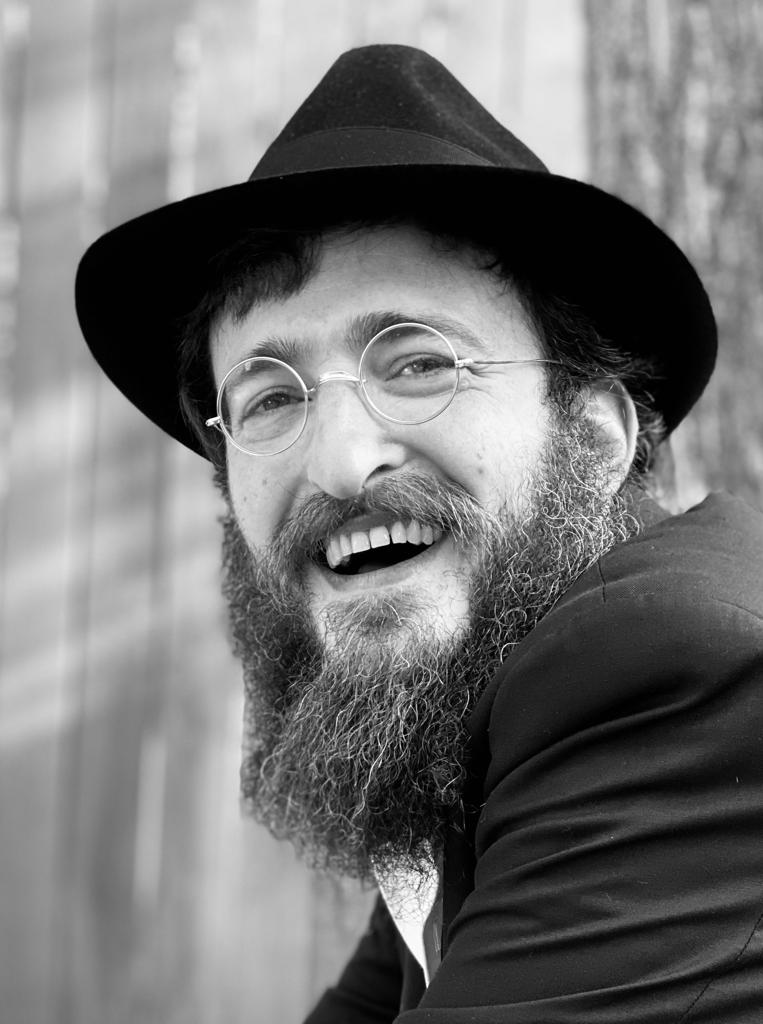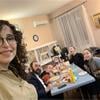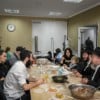In the last 72 hours, Kharkov, Ukraine’s second city, has been rocked by increasingly heavy aerial bombardment and shelling. Earlier today, artillery slammed into a residential neighborhood, with reports of dozens of civilians killed and hundreds injured. All this has made Chabad-Lubavitch of Kharkov’s emergency relief work all the more necessary, and all the more dangerous.
“We managed to get over to the synagogue this morning and we’re staying here now,” says Miriam Moskovitz, who together with her husband, Rabbi Moshe Moskovitz, the city’s chief rabbi, has led the Kharkov Jewish community since 1990. “We basically have people streaming into the synagogue now. Anyone who is nearby, we’re telling them just to come here because at this point it’s one of the safest places to be in the city.” Aside from the food, Chabad’s Choral Synagogue is a big solid building with a large basement area where people can run for cover under attack.
After a Sunday spent indoors—during which Russian troops entered the city before being expelled—Moskovitz was able to dispatch a few brave Jewish community members to collect various necessities from other Jewish community sites in the city. They’ve brought mattresses and blankets from the yeshivah, and food and staples from the Jewish preschool. The regional children’s hospital on Klochkivska street, right near the preschool, was bombed earlier today.
“People are running out of food and we don’t have enough drivers willing to go out to deliver anything because the bombing has been so heavy,” reports Moskovitz. “But it’s slowly coming together.”
Though the bombardment has gotten heavier, in some ways Monday proved easier than the day before because there were windows of opportunity to move from one place to another. Fighting was heavy on Sunday—a nine-story apartment building in the city suffered a direct hit—but it was the early morning breakthrough of Russian troops through Ukrainian defenses that brought all traffic in the city to a standstill. Russian tanks driving through Kharkov’s city streets set off the first urban street fighting the city has seen since World War II.

The Russians were pushed out of the city by Sunday afternoon—one Russian tank exploded a few blocks away from the synagogue, spewing black smoke high above the city center—and Ukraine has regained full control of the city, but fighting has only gotten more intense since.
“Sunday we were fielding phone calls all day,” she says. “I had someone having a panic attack, she was begging us to come bring her to synagogue but all we could do today was calm her down, there was no way to leave the house at all. I got another call about a blind woman living alone on an 8th floor, and we couldn’t even get to her at the moment. It was painfully impossible to move.”
With traffic to Ukraine’s western border now measured in days not hours, evacuation remains impractical for most. Chabad’s kitchen is feeding the growing number of local Jews (and non-Jews) finding safe haven in the Choral Synagogue, and they’re also preparing thousands of care packages, including fresh bread, kasha and other staples, which are already being distributed.

Shabbat Under Siege
Once every month Jews around the world gather in their local synagogues on Shabbat to bless the upcoming lunar month, called Shabbat Mevarchim (“the Shabbat when we bless.”) Prior to morning prayer services, the Chassidic custom has long been to gather as a quorum and together recite the Book of Psalms, beginning to end. The new month is then blessed during services, and then a Chassidic farbrengen gathering is held.
“The farbrengen [held in honor of Shabbat Mevarchim] should be scheduled to suit the conditions of the place in which they live,” the Rebbe, Rabbi Menachem M. Schneerson, of righteous memory, wrote in his Hayom Yom. “And may they enjoy success there, both materially and spiritually.”
This past weekend was Shabbat Mevarchim, and for the Jews of Kharkov, “the conditions of the place in which they live” meant a 6 p.m. curfew as of Saturday (it was still 10 p.m. on Friday night), the ever-louder sounds of artillery fire and explosions, and the recognition that with every passing minute combat was approaching their once-calm city. Indeed, war has since engulfed Kharkov.
“Friday night there was a lot of rumbling and explosions, but when we started Kabbalas Shabbos [the evening prayer welcoming Shabbat], things suddenly quieted down,” says Rabbi Levi Raices, a Chabad emissary in Kharkov since 1994. At one point, some kind of military aircraft flew at a very low altitude over Raices’ home as he sat with his family and guests at the Shabbat meal. “When you hear a plane like that in this situation you get very nervous,” he says. Raices lives in a solid, old pre-Revolutionary building, and he notes that he and his family use their building hallway as a shelter when the bombings get louder. Others in the city are using their basements and the subways, and by now at least 100 men, women and children are holed up in the Choral Synagogue.

“I went to shul the next morning, and we had a very nice-sized group of people for tehillim [Psalms] and [prayers],” says Raices. The shelling got loud during prayers, with the lights of the massive synagogue flickering on and off and the reverberations coursing through the worshippers’’ legs. “During kedushah [recited during the repetition of the Amidah] it got really loud, like the ministering angels themselves were joining in.”
When prayers concluded, the community assembled in the basement dining room for Shabbat Mevarchim farbrengen that continued on for the duration of the day. “It was a very joyous farbrengen,” says Raices. “It wasn’t even what was said; it was just everyone being together, singing all day, saying l’chaim. It was a very special feeling in the room.”
They spoke of the miracles the Rebbe had foreseen during the onset of the Gulf War in 1991, and local Jews, led by community president Alexander Kaganovsky, expressed their thanks to the Rebbe’s emissaries for not having abandoned the city for a moment.
“Reb Moshe [Moskovitz],” an emotional Kaganovsky said. “I want to tell you in the name of everyone in our community, that we want to thank all of you shluchim [emissaries] who have stayed behind to be together with us. We now see that all of what you have been saying all these years that you are one inseparable part of the community is true”
It is not only the Jews of Ukraine who have expressed thanks. Chabad rabbis and their wives around Ukraine have reported being approached in the street or in supermarkets by non-Jewish Ukrainians, complete strangers, thanking them for their continued presence in their cities.

With Russian positions inching ever-closer to Kharkov, on Saturday it became known that the curfew had been moved up to 6 p.m., and towards the end of Shabbat people began heading out to make it home on time.
Then the fighting really began.
Until Saturday night, if the shelling and fighting was loud at least it was somewhere on the outskirts of the city. But the Russians kept moving in and the battle was getting closer.
“Going outside at any point Sunday was risky business,” says Raices. He and his family remained at home for the duration of the day, mostly reciting Psalms.
“I’ve gotten used to the bombing, but Sunday I had to get used to the rat-a-tat of machine gun fire,” says Miriam Moskovitz. Early Sunday morning she sent an emergency message to the Ohel, the Rebbe’s resting place in Queens, asking for a blessing for the safety of the people of Kharkov, peace, and the coming of Moshiach.

Though the block-by-block street-fighting has ceased, the entire city is now under heavy Russian bombardment and images of the innocent dead, groceries and water still in hand, have become the new symbol of the war in Kharkov.
Moskovitz stops for a moment to consider her hometown’s predicament: “It’s unreal,” she says. “I just want to wake up from this nightmare.”
The month the Jews of Ukraine and their brethren around the world just blessed is Adar II, which contains Purim, the holiday marking the sudden annulment of a harsh decree and the blessing of “light, happiness, rejoicing and glory,” for the Jewish people and for all their peaceful neighbors.
The Ukraine Jewish Relief Fund has been established to help provide assistance to the Jewish communities in Ukraine impacted by the war.
Click here for a prayer you can say and a list of good deeds you can do in the merit of the protection of all those in harm’s way.









Join the Discussion